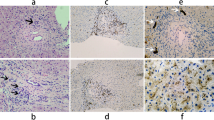Abstract
The low phospholipid-associated cholelithiasis (LPAC) syndrome was reported in European adults with cholelithiasis and a mutation of the ATP-binding cassette subfamily B member 4 (ABCB4). The ABCB4 encodes multidrug resistance 3, which is a phospholipid translocator. Reduced phospholipid transport can lead to the formation of biliary cholesterol stones. Here, we describe a 31-year-old Japanese man diagnosed with recurrent biliary colic. Although he recovered quickly after endoscopic treatment for the most recent presentation, he had a family history of similar problems. His mother had required endoscopic treatment for choledocholithiasis and his maternal aunt had died at age 29 years because of liver failure (etiology unknown). We, therefore, performed genetic analysis, which revealed a heterozygous ABCB4C717S. LPAC syndrome was diagnosed and the patient has received ursodeoxycholic acid for 2 years with no recurrence. The same variant was identified in the patient’s mother, who was subsequently found to have a left intrahepatic calculus requiring left-sided lobectomy. She has received ursodeoxycholic acid for 1 year with no recurrence. ABCB4C717S is a novel pathogenic variant, and this is the first patient diagnosed with LPAC syndrome in Japan. We should consider LPAC syndrome in young adults with recurrent cholesterol gallstones to ensure early therapy.



Similar content being viewed by others
References
Lammert F, Gurusamy K, Ko CW, et al. Gallstones. Nat Rev Dis Primers. 2016;2:16024.
Rosmorduc O, Poupon R. Low phospholipid associated cholelithiasis: association with mutation in the MDR3/ABCB4 gene. Orphanet J Rare Dis. 2007;2:29.
Gordo-Gilart R, Andueza S, Hierro L, et al. Functional analysis of ABCB4 mutations relates clinical outcomes of progressive familial intrahepatic cholestasis type 3 to the degree of MDR3 floppase activity. Gut. 2015;64:147–55.
Delaunay JL, Durand-Schneider AM, Dossier C, et al. A functional classification of ABCB4 variations causing progressive familial intrahepatic cholestasis type 3. Hepatology. 2016;63:1620–31.
Park HJ, Kim TH, Kim SW, et al. Functional characterization of ABCB4 mutations found in progressive familial intrahepatic cholestasis type 3. Sci Rep. 2016;6:26872.
Rosmorduc O, Hermelin B, Poupon R. MDR3 gene defect in adults with symptomatic intrahepatic and gallbladder cholesterol cholelithiasis. Gastroenterology. 2001;120:1459–67.
Gonzales E, Spraul A, Jacquemin E. Clinical utility gene card for: progressive familial intrahepatic cholestasis type 3. Eur J Hum Genet. 2014. https://doi.org/10.1038/ejhg.2013.188.
Poupon R, Rosmorduc O, Boëlle PY, et al. Genotype-phenotype relationships in the low phospholipid associated cholelithiasis syndrome: a study of 156 consecutive patients. Hepatology. 2013;58:1105–10.
Rosmorduc O, Hermelin B, Boëlle PY, et al. ABCB4 gene mutation-associated cholelithiasis in adults. Gastroenterology. 2003;125:452–9.
Smit JJ, Schinkel AH, Oude Elferink RP, et al. Homozygous disruption of the murine mdr2 P-glycoprotein gene leads to a complete absence of phospholipid from bile and to liver disease. Cell. 1993;75:451–62.
Wendum D, Barbu V, Rosmorduc O, et al. Aspects of liver pathology in adult patients with MDR3/ABCB4 gene mutations. Virchows Arch. 2012;460:291–8.
Tougeron D, Fotsing G, Barbu V, et al. ABCB4/MDR3 gene mutations and cholangiocarcinomas. J Hepatol. 2012;57:467–8.
Vij M, Safwan M, Shanmugam NP, et al. Liver pathology in severe multidrug resistant 3 protein deficiency: a series of 10 pediatric cases. Ann Diagn Pathol. 2015;19:277–82.
Tebbi A, Levillayer F, Jouvion G, et al. Deficiency of multidrug resistance 2 contributes to cell transformation through oxidative stress. Carcinogenesis. 2016;37:39–48.
Vij M, Shanmugam NP, Reddy MS, et al. Hepatocarcinogenesis in multidrug resistant P-glycoprotein 3 deficiency. Pediatr Transplant. 2017;21.
Mhatre S, Wang Z, Nagrani R, et al. Common genetic variation and risk of gallbladder cancer in India: a case-control genome-wide association study. Lancet Oncol. 2017;18:535–44.
Degiorgio D, Colombo C, Seia M, et al. Molecular characterization and structural implications of 25 new ABCB4 mutations in progressive familial intrahepatic cholestasis type 3 (PFIC3). Eur J Hum Genet. 2007;15:1230–8.
Lek M, Karczewski KJ, Minikel EV, et al. Analysis of protein-coding genetic variation in 60,706 humans. Nature. 2016;18:285–91.
Davydov EV, Goode DL, Sirota M, et al. Identifying a high fraction of the human genome to be under selective constraint using GERP++. PLoS Comput Biol. 2010;6:e1001025.
Poupon R. Ursodeoxycholic acid and bile acid mimetics as therapeutic agents for cholestatic liver diseases: an overview of their mechanisms of action. Clin Res Hepatol Gastroenterol. 2012;36:S3–12.
Delaunay JL, Bruneau A, Hoffmann B, et al. Functional defect of variants in the adenosine triphosphate-binding sites of ABCB4 and their rescue by the cystic fibrosis transmembrane conductance regulator potentiator, ivacaftor (VX-770). Hepatology. 2017;65:560–70.
Author information
Authors and Affiliations
Corresponding author
Ethics declarations
Conflict of interest
The authors declare that they have no competing interests.
Human/animal rights
All procedures followed have been performed in accordance with the ethical standards laid down in the 1964 Declaration of Helsinki and its later amendments.
Informed consent
Informed consent was obtained from all patients for being included in the study.
Additional information
Publisher's Note
Springer Nature remains neutral with regard to jurisdictional claims in published maps and institutional affiliations.
Rights and permissions
About this article
Cite this article
Ishizawa, T., Makino, N., Kakizaki, Y. et al. A novel pathogenic variant of ATP-binding cassette subfamily B member 4 causing gallstones in a young adult. Clin J Gastroenterol 12, 637–641 (2019). https://doi.org/10.1007/s12328-019-00991-x
Received:
Accepted:
Published:
Issue Date:
DOI: https://doi.org/10.1007/s12328-019-00991-x




